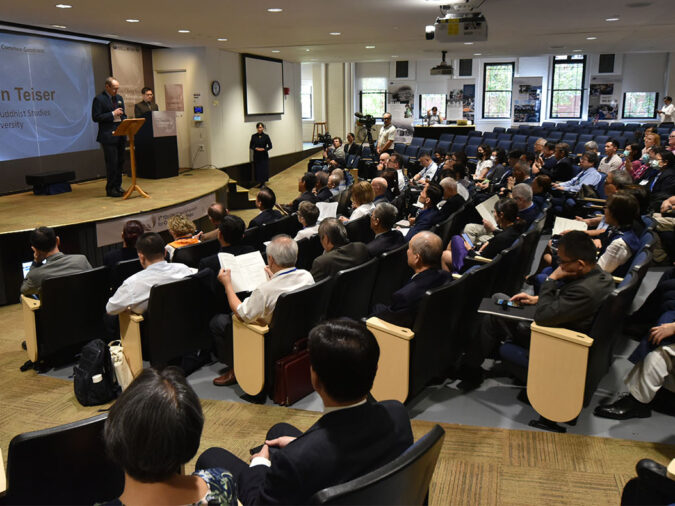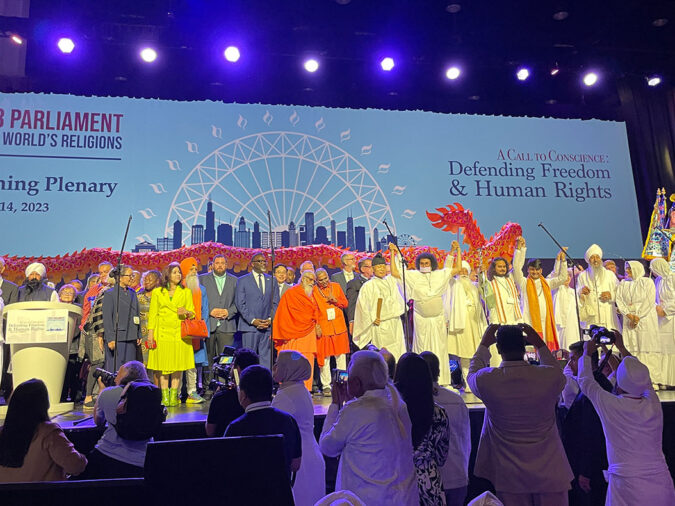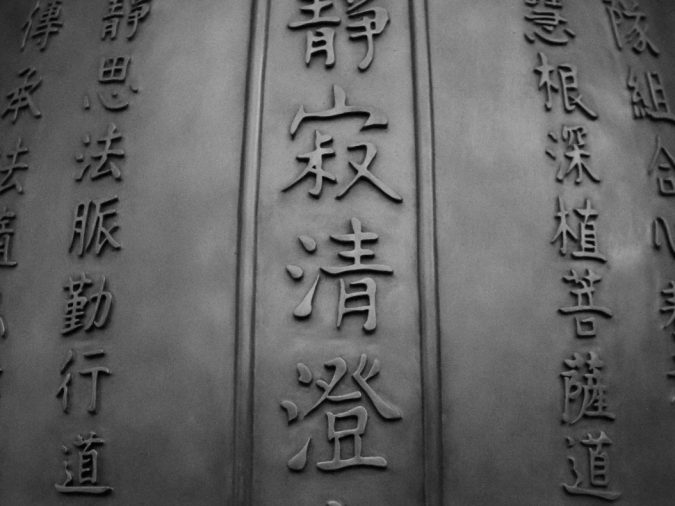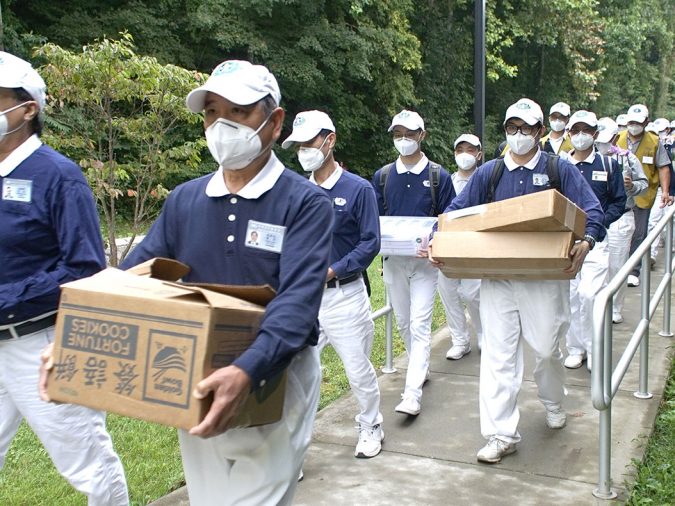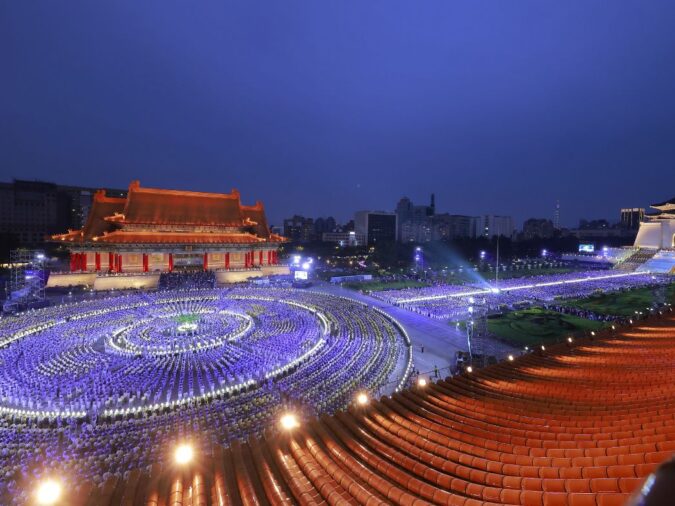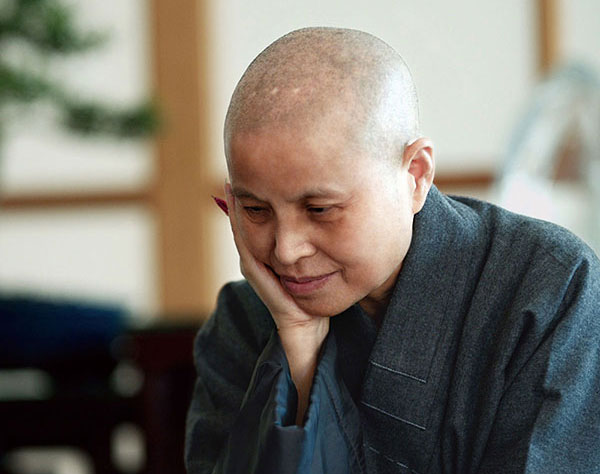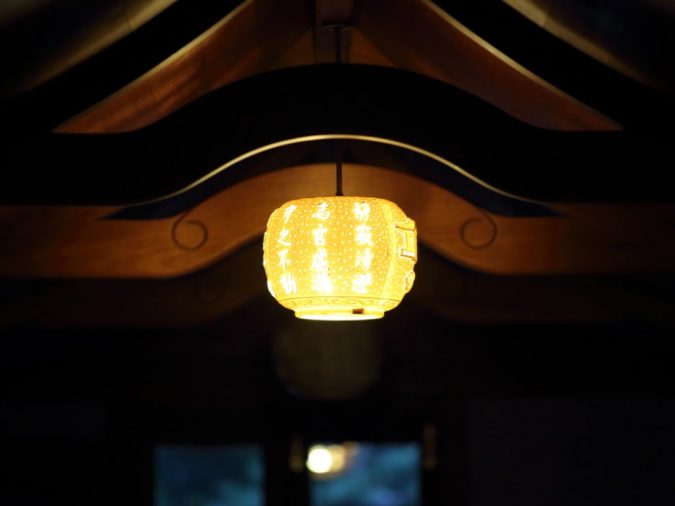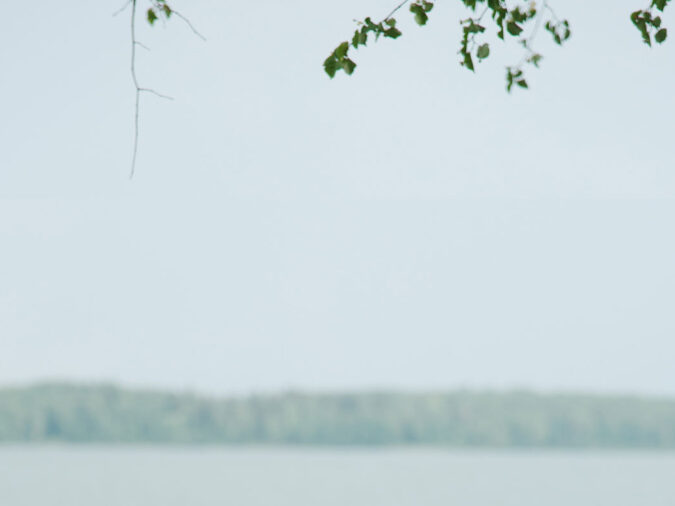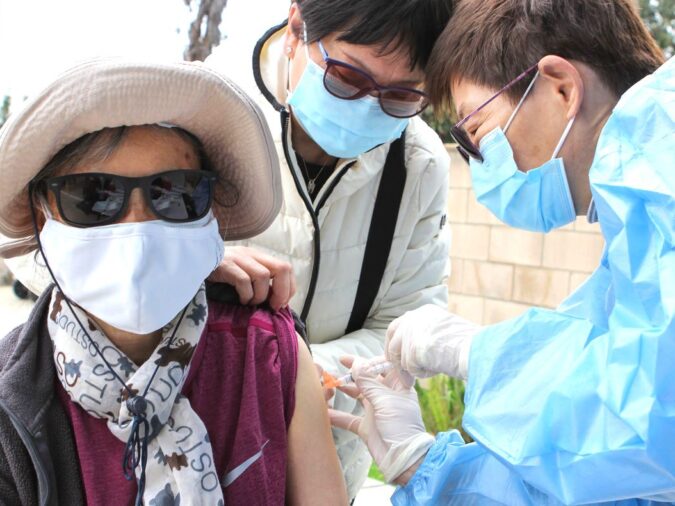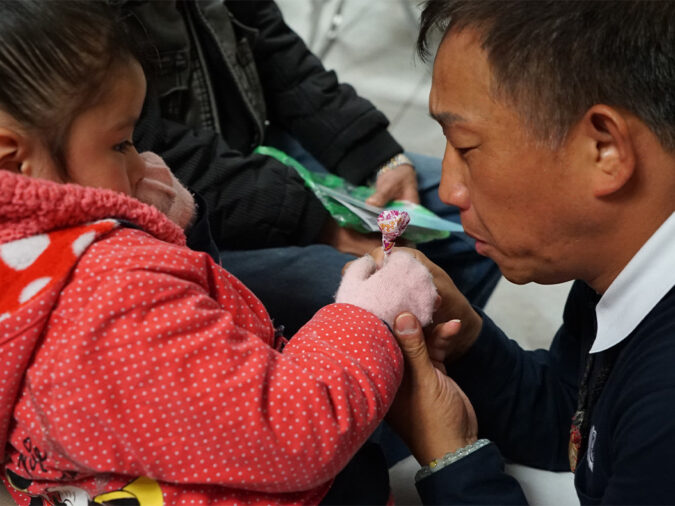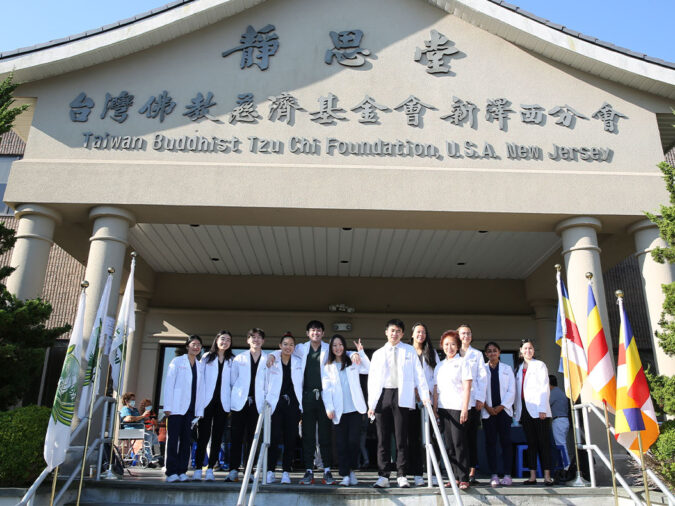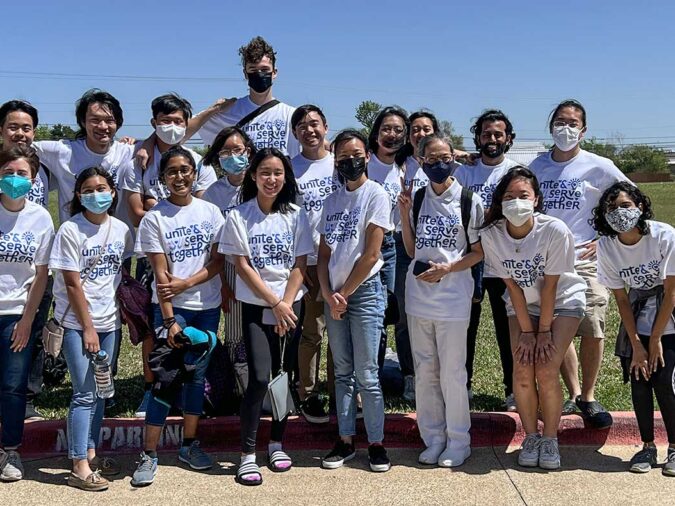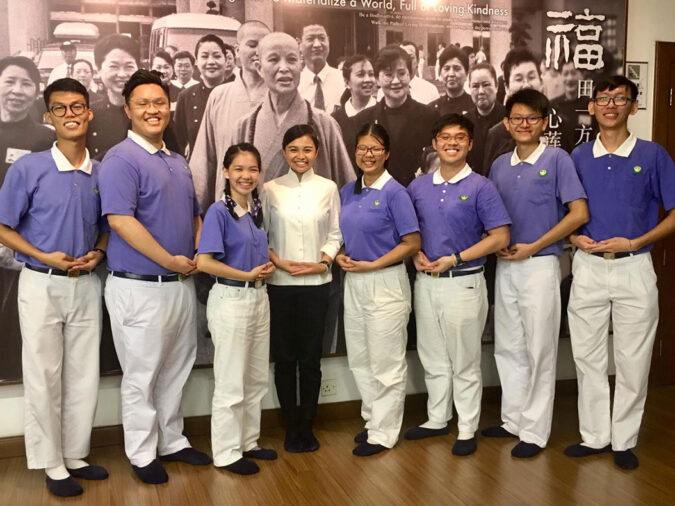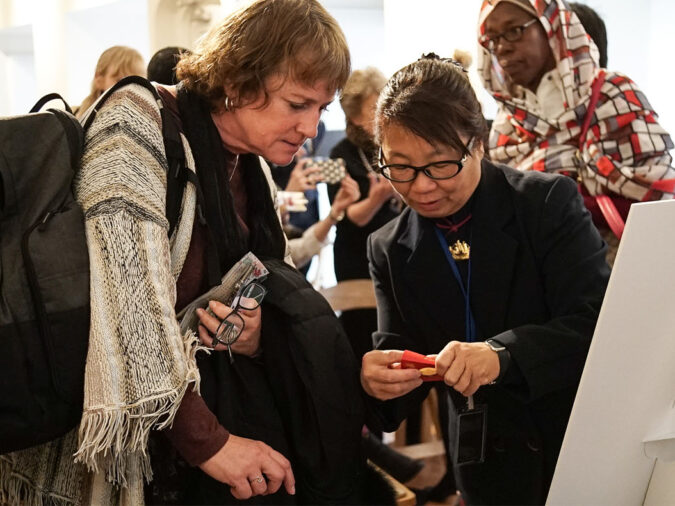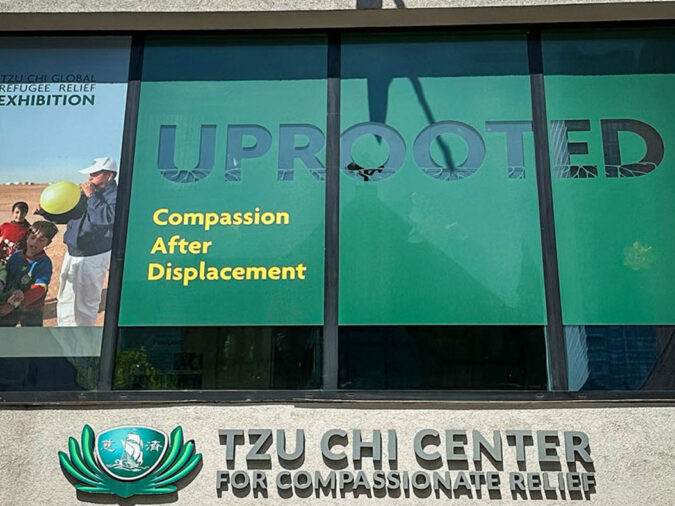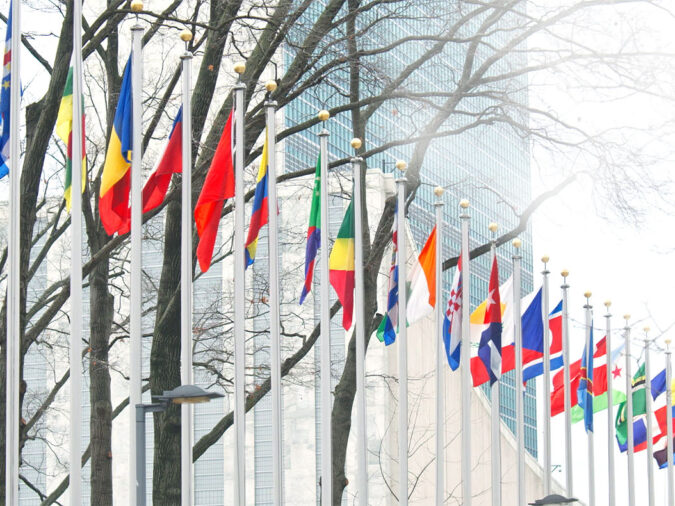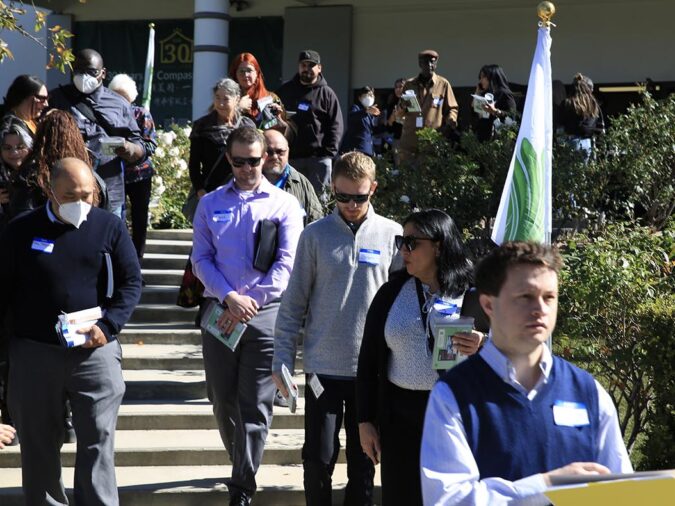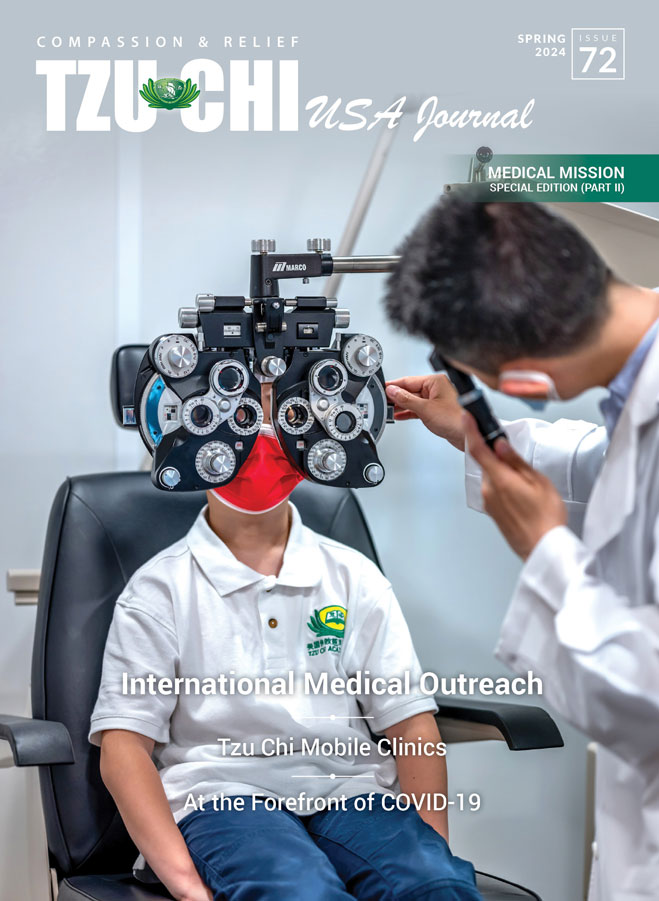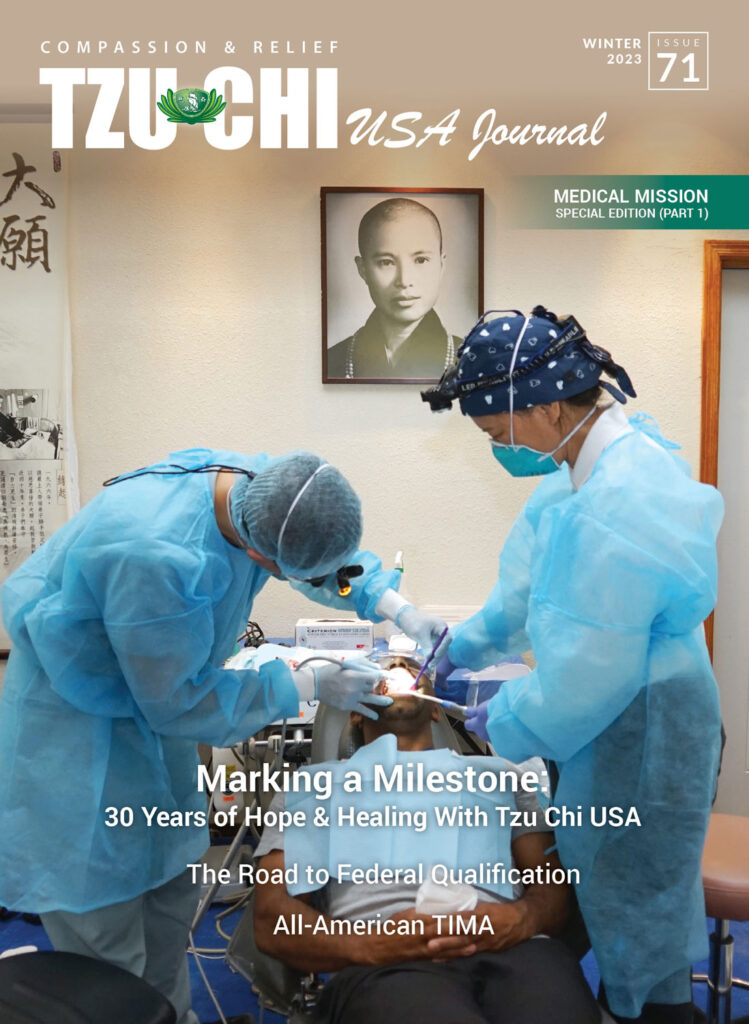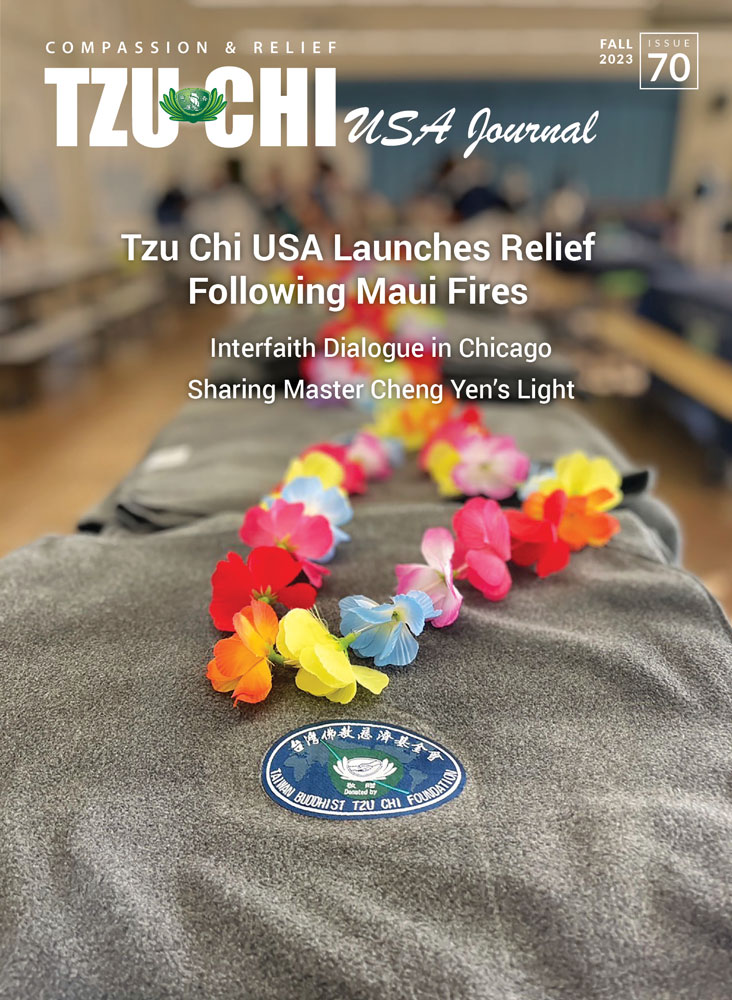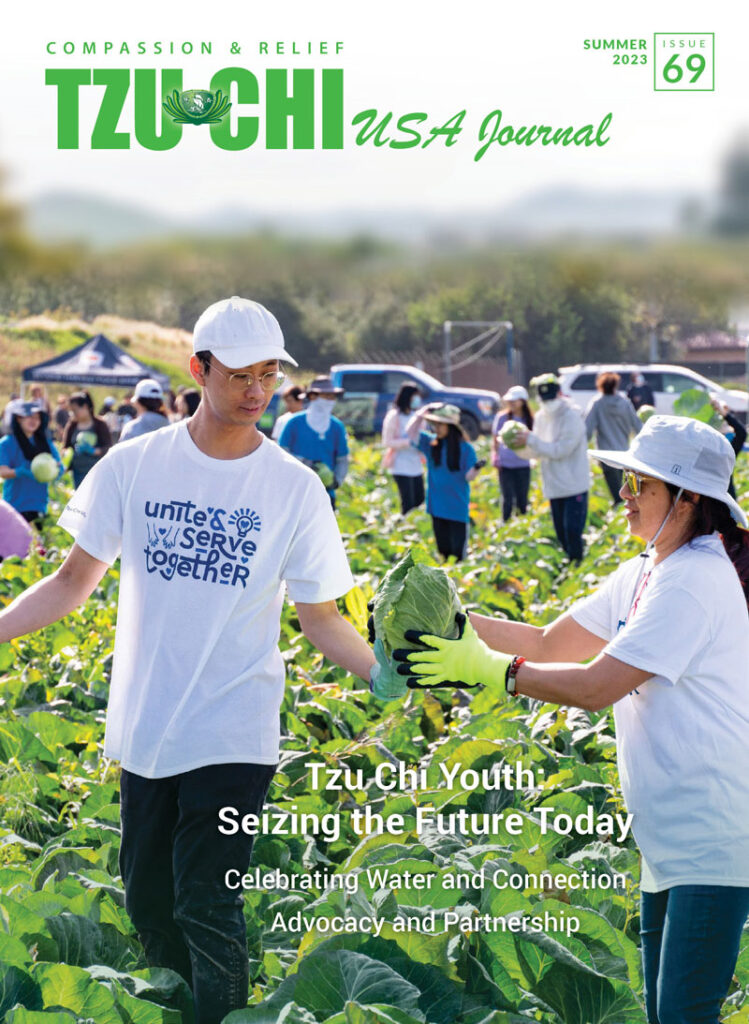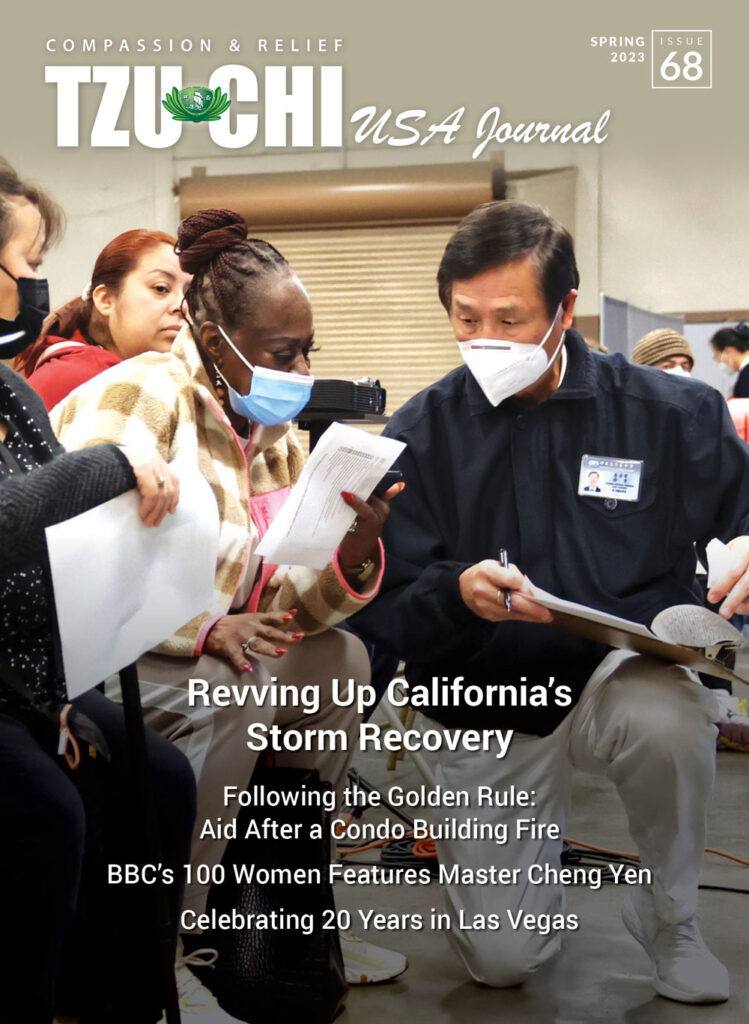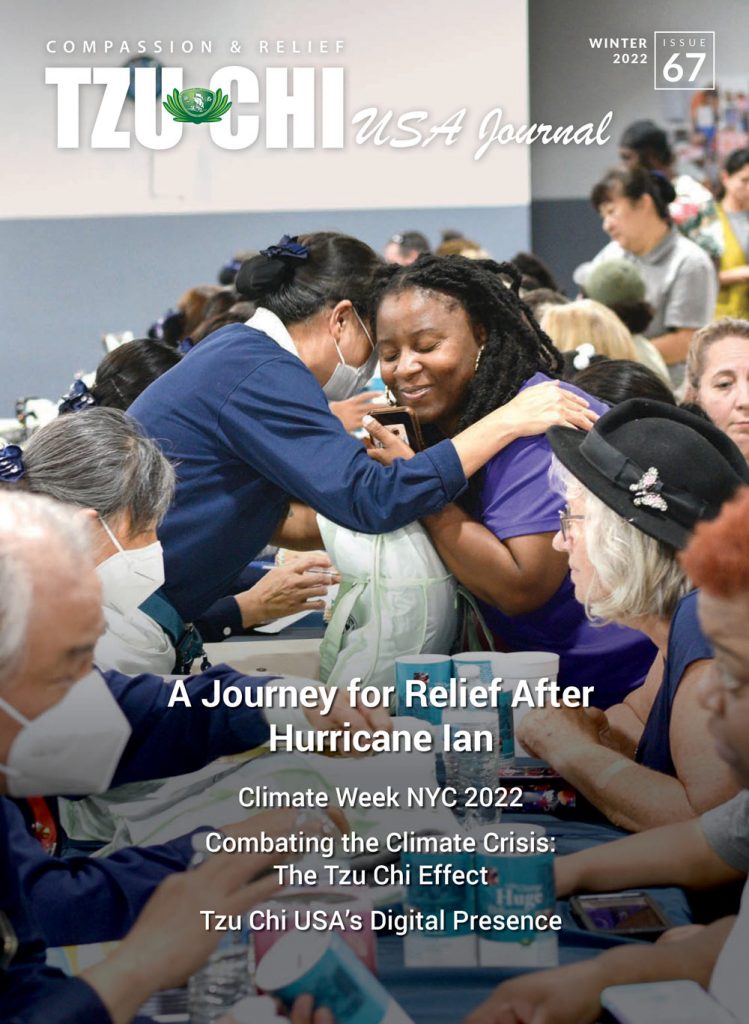On a Mission to Bring Dharma Master Cheng Yen’s Light to Chicago
Written by Ida Eva Zielinska
Published #70 | Fall 2023 Issue
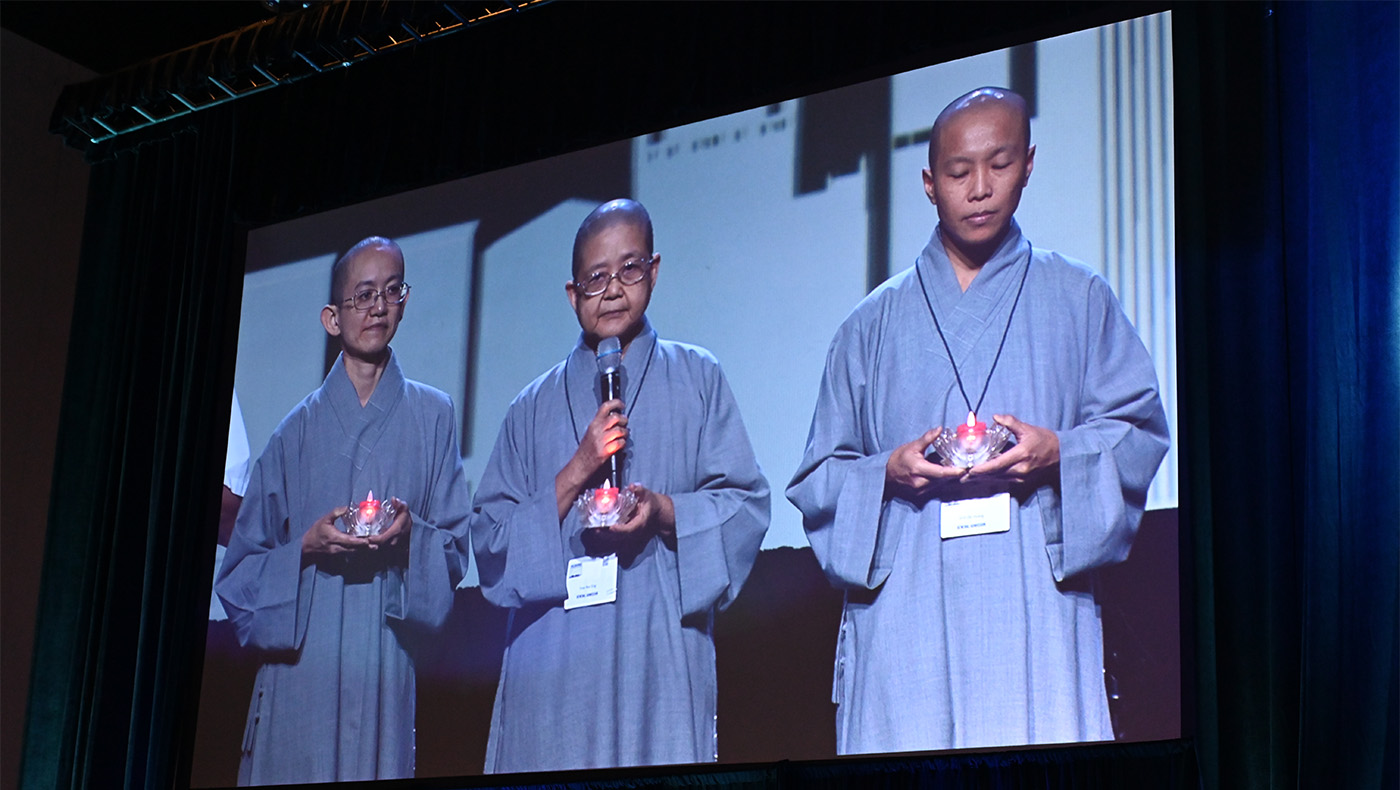
Shih De Yuan (middle), Shih De Cheng (left), and Shih De Huang (right) lead a Buddhist prayer during the Parliament of the World’s Religions Climate Action Assembly on August 14, 2023. Photo/Ting Fan
SHARE:
From the moment Ven. Shih De Yuan, Ven. Shih De Cheng, and Ven. Shih De Huang set foot in Chicago, Illinois, on August 12, 2023, the Tzu Chi family surrounded them with love and care. The three Dharma Masters flew in from Taiwan, where they live in the Jing Si Abode in Hualien alongside Ven. Dharma Master Cheng Yen. They had come to join the Tzu Chi delegation participating in the Parliament of the World’s Religions (PoWR) that would run from August 14 to 18 at the McCormick Place Lakeside Center on Chicago’s lakefront. [Read about Tzu Chi’s presence at the 2023 PoWR in our cover story.]
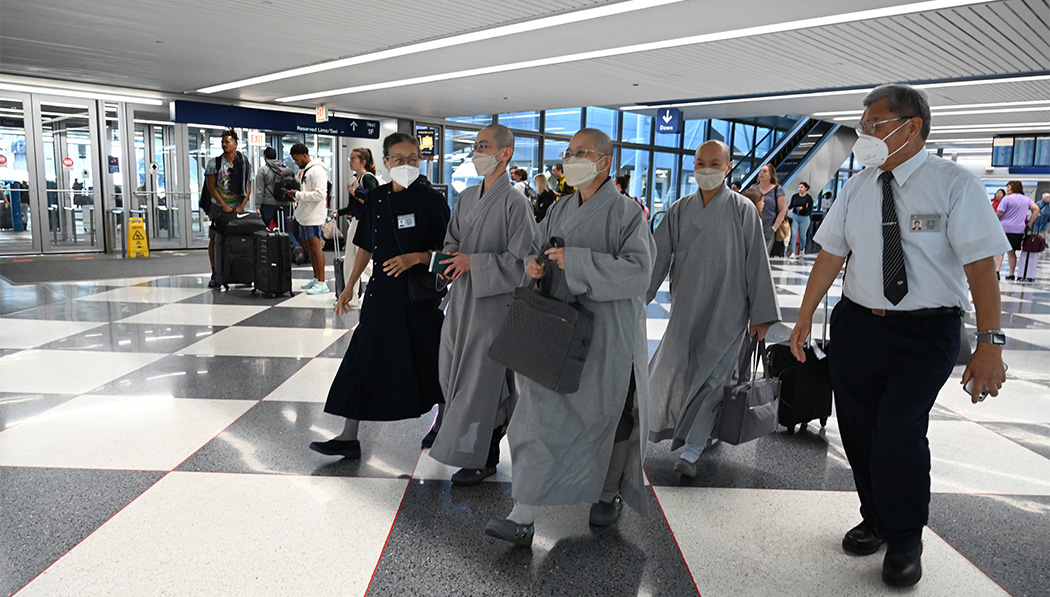
Shortly after they landed, the Dharma Masters addressed everyone in the Tzu Chi USA Midwest Region office’s main hall, expressing their aspirations for the upcoming week of interfaith dialogue. While they felt immediately at home, visiting what was akin to another petal of the global Tzu Chi family lotus, the hosts felt blessed by their presence as representatives of Master Cheng Yen, their revered and beloved teacher.
Looking Toward the Week Ahead
For Shih De Yuan, this was her second time attending a convening of the PoWR, as she was a delegate in 2018. Tzu Chi’s presence is important, “There are so many religions and faiths in this world that people may not understand what Tzu Chi is and has done. When we come out, they can have more direct contact with us,” she explained, stressing the uniqueness of Tzu Chi’s Buddhist practice approach of actively putting compassion into action to relieve suffering. “Sometimes we may know a lot of philosophy, but if we don’t put it into action, we may not realize it or learn from it; wisdom will not come out from there.” She also highlighted the need for interfaith dialogue and collaboration, which the PoWR would fulfill.
When people are practicing and going towards world peace, we should work together. Of course, there will be so many methods to practice. Just like in Buddhism, Buddha also said that we have 84,000 ways of practice; the only thing is to attain enlightenment. We should look at the similarities of faiths: This is a good way to communicate and then work together.
Ven. Shih De Yuan
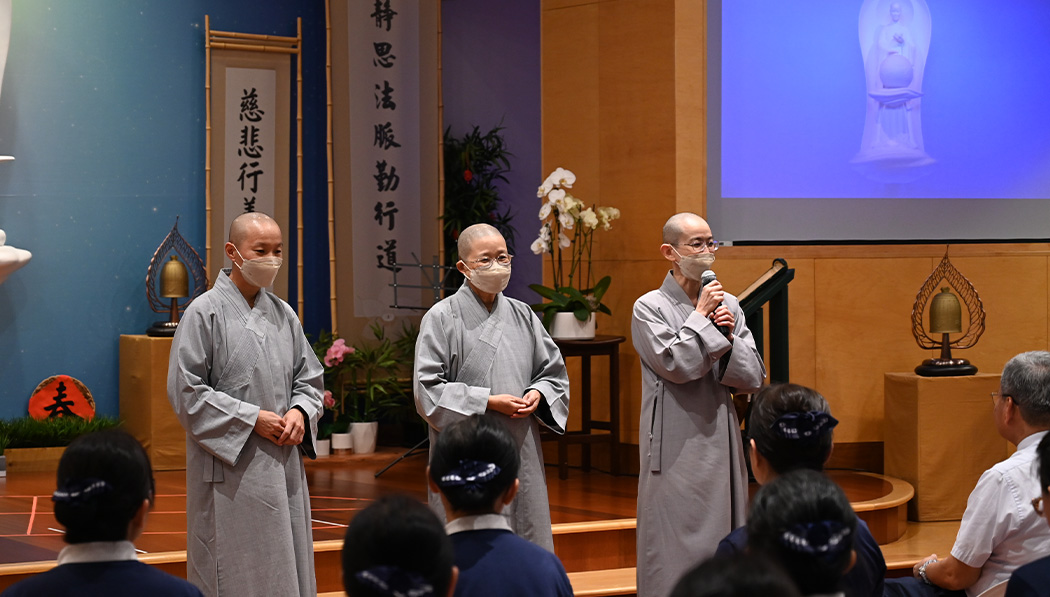
Shih De Cheng and Shih De Huang had never participated in a PoWR gathering before. “Master Cheng Yen mentioned that she wanted to promote environment protection, vegetarianism, and international disaster relief,” Shih De Cheng stated. And yet, she divulged feeling nervous about speaking at an international conference for the first time. “I feel like my abilities aren’t good enough. However, I realized that I’m presenting Master Cheng Yen and Tzu Chi to promote a very positive message, introducing concepts like Buddhist compassion to everyone. So I thought, ‘Alright! Let’s do it!’”
Pondering what lay ahead, Shih De Huang reflected, “In this era of high technology, I think everyone is maybe lost. The person, the ego, is very important. Master Cheng Yen wants us to [advocate] turning small love into great love – not only being concerned about a small family but caring for all beings.”
Master Cheng Yen advised the monastics representing her: “Even if one person is listening to what you say, you must also tell them. Even one person, you don’t care about how many people are listening,” Shih De Yuan recounted. However, the 2023 PoWR would receive over 7,000 people from nearly 100 countries, representing over 200 spiritual traditions, so many would have a chance to hear what the three Dharma Masters had to say.
Guiding Buddhist Ceremonies
During the week, Shih De Yuan, Shih De Cheng, and Shih De Huang, alongside Allan Chung, who is on the Dharma as Water team in charge of translating Master Cheng Yen’s writings into English, led two Buddha Bathing Ceremony sessions in the PoWR’s Buddhist Prayer Room. The ceremony is a symbolic act to purify the heart, helping to cleanse oneself of inner afflictions. From a Tzu Chi perspective, a purified heart is a prerequisite to serving those in need with compassion.
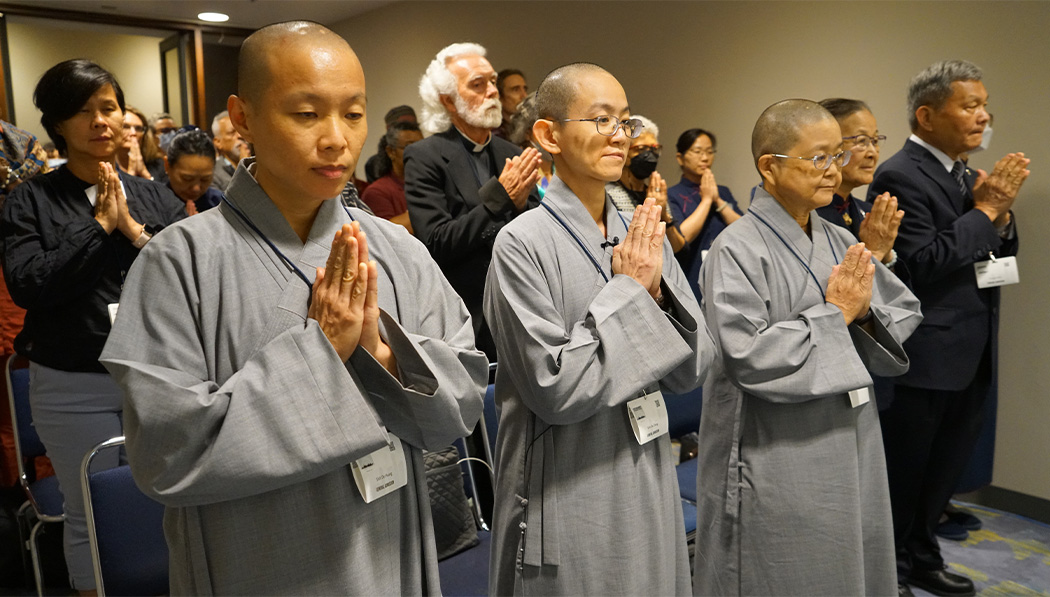
We hold the Buddha Bathing Ceremony because we want to show gratitude to the Buddha, our parents, and all sentient beings. We need to pay lots of attention to the whole world instead of ourselves. No matter what religion, if we harbor the vast truth and love in our hearts, there are no boundaries.
Ven. Shih De Cheng
We want to share peace and harmony with everyone. When we’re doing the ritual, we show respect and want to remind ourselves that we have our own intrinsic Buddha Nature as well.
Ven. Shih De Cheng
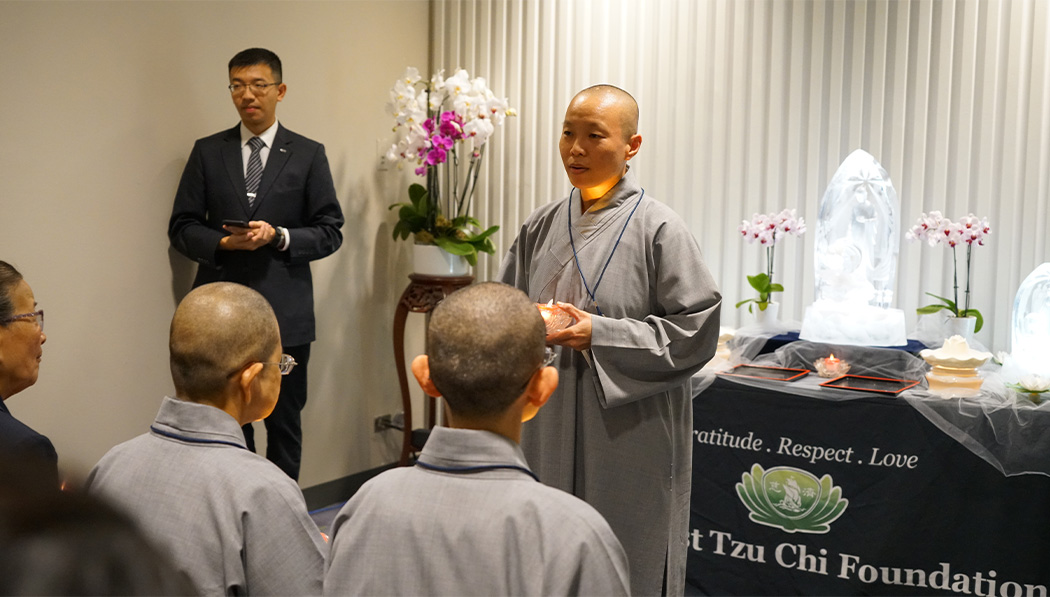
“I was very touched by the amount of people coming in,” Shih De Yuan noted as the prayer room filled beyond capacity. Without skipping a beat, the Tzu Chi team made room for everyone. Once Chung and the Dharma Masters explained the meaning of the ritual, Tzu Chi volunteers demonstrated how to take part, and the session attendees each had a turn. At the conclusion, participants held electric candles in lotus-shaped holders as they listened to a favorite Tzu Chi song, “Love and Care for All,” which moved some to tears.
I felt disconnected today, and this grounded and really touched my heart. It's exactly what I needed to remember, the point of being here and helping everyone in whatever way we can.
David Faber
Indigenous Task Force
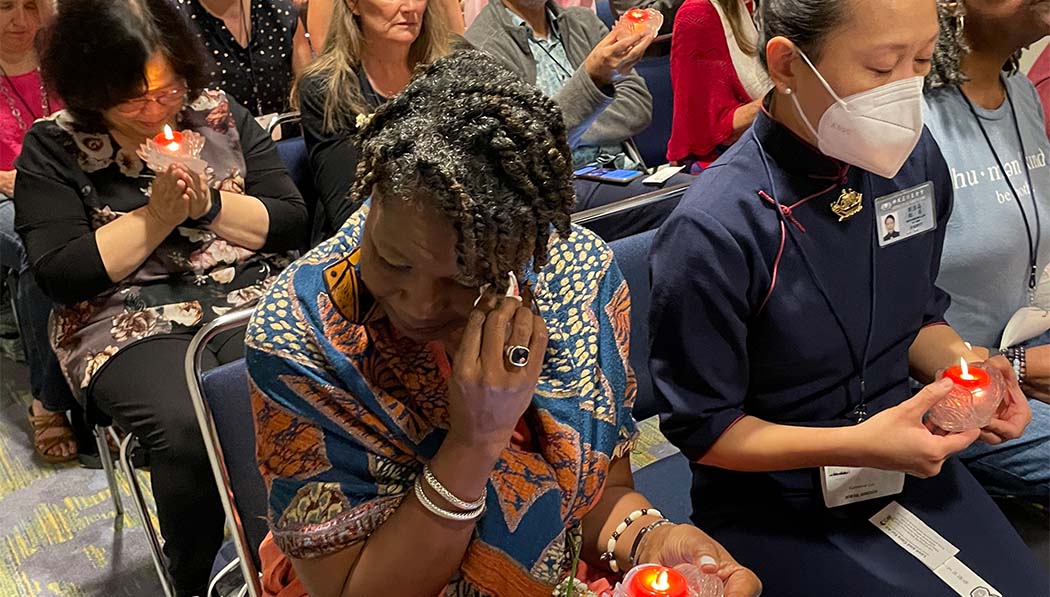
Showcasing Buddhism in Action
On August 15, Shih De Yuan was a panelist in the “Buddhism in Action: Turning Life Around in the Buddha’s Homeland” session moderated by Johan Alwall from the Buddhist Tzu Chi Charity Foundation. She presented Tzu Chi’s disaster relief and charity work in Nepal and India.
Shih De Yuan outlined Tzu Chi’s first aid project in Nepal in 1993, building 1,800 houses following a severe flood, then disaster relief after the 2015 earthquake, a mission that helped more than a million people. In 2022, Tzu Chi returned to Nepal to relieve suffering, beginning in Lumbini, home to Lumbini Garden, the sacred Buddhist site where the Buddha was born. “Life inside and outside the Lumbini Garden is totally different. When we walk out of Lumbini Garden, we can see the life of poverty,” Shih De Yuan described.
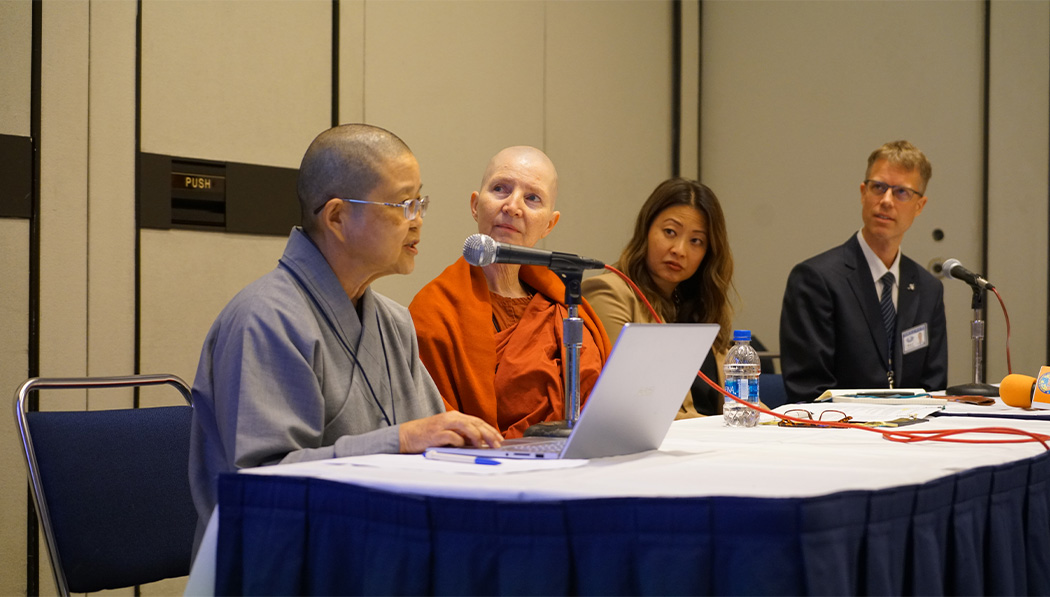
Tzu Chi’s aid focuses on students, as the dropout rate due to family poverty is grave. In addition to distributions of supplies and the subsidy of nutritious lunches plus transportation fees, Tzu Chi volunteers launched a character education program based on Master Cheng Yen’s Jing Si Aphorisms. One of the students’ favorites, which has raised their confidence, is “Do not underestimate yourself; everyone has unlimited potential,” Shih De Yuan reported. Mid-term relief here will involve building a school and model homes.
In India, Tzu Chi provides aid in and around Bodhgaya, the sacred Buddhist site where the Buddha attained enlightenment. Shih De Yuan explained that in this region, “most children don’t go to school due to the caste system. They become beggars to get by.” Tzu Chi volunteers conduct home visits, provide aid according to needs, and offer Buddhist guidance that inspires the villagers to give back. Some began putting aside a handful of rice daily to donate to others in need. A group of women received training about recycling and gained environmental awareness, which motivated them to mobilize the community to clean up their village.
Since Tzu Chi came, we learned that in addition to receiving aid, we can do our part to give; we can give in any way, not necessarily money.
Care Recipient
Turning life around in Buddha’s homeland will be a very long journey, but Tzu Chi volunteers made a vow to help the people there achieve it, no matter how long it takes.
Ven. Shih De Yuan
The other panelists also presented how the groups they were representing are helping in India and Nepal. Ven. Ayyā Dhammadīpā described the work of Buddhist Global Relief (BGR), a nonprofit founded by Ven. Bhikkhu Bodhi. BGR raises funds and then partners with other organizations active in that part of the world. Starting with five projects in 2008, it has 60 partner projects today. “Not just Buddhists,” Dhammadīpā added, as BGR doesn’t focus on religious affiliation. Their primary goal is to combat hunger, hoping that with their nutritional needs met, people can actualize their fullest potential for goodness and meaning in their lives.
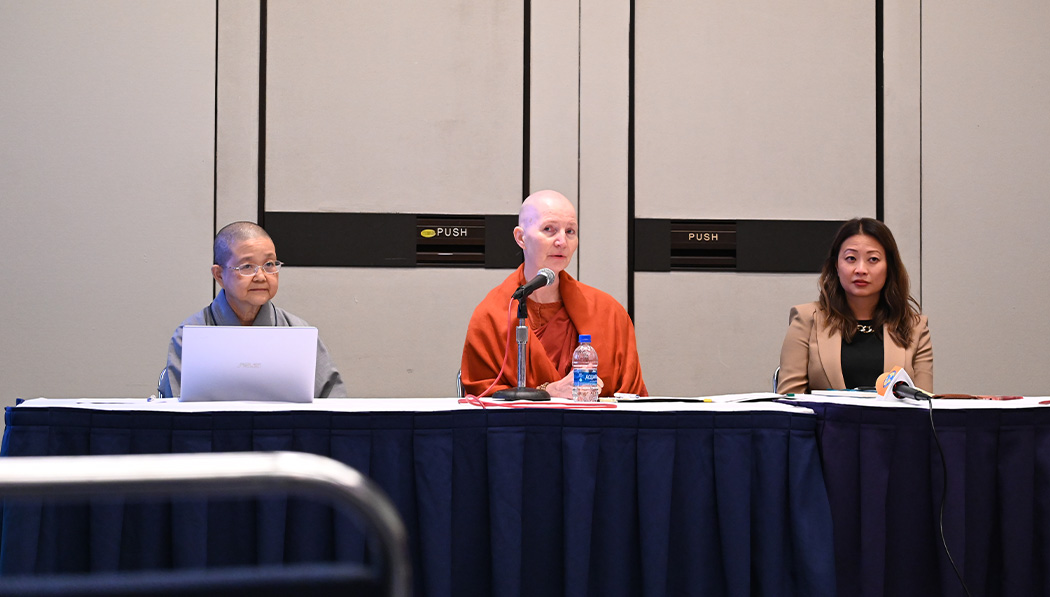
Ven. Lopön Jigme Tingdzin, a nun in the Drukpa Kagyu lineage of Tibetan Buddhism, joined via video message from Nepal and shared the unique way of practice that she and her fellow monastics are engaged in that involves learning Kung Fu, which they do for their protection. Among their activities, the nuns undertake grueling pilgrimages on foot or bicycle to raise environmental awareness, and they provide disaster relief, including dangerous search and rescue. During the COVID-19 pandemic, they collaborated with Tzu Chi to help provide medical supplies and train women to be public health educators.
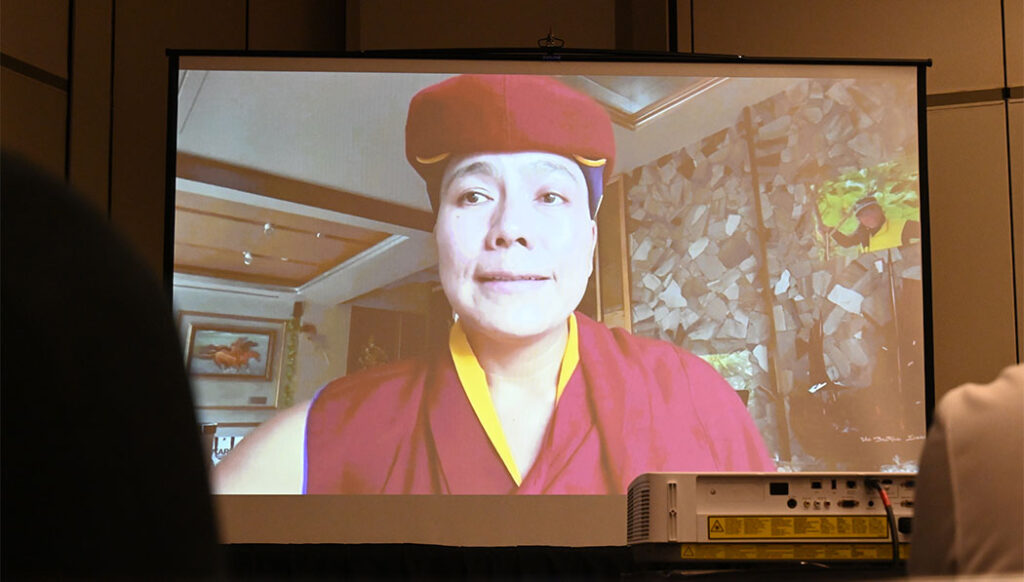
Panelist Carrie Lee, a representative of the “Kung Fu Nuns,” as they’ve come to be known, and also President of Live to Love International, which provides humanitarian relief and education in the Himalayas, revealed the risks and discrimination the monastics face, from threats to burn down their nunnery to actual physical assault. “Many of us have heard the story; if you’re a well-behaved nun, you can come back in your next life to become a monk and then become enlightened,” Lee said. And yet, despite the dangers and the fact that they come from places where people don’t expect girls to do much outside of the kitchen or housework, the Kung Fu Nuns persist.
Over the years, we learned that to really practice spirituality, we must be active, physically strong, and confident. So many people need help out there. The whole world is going through global warming problems, climate change problems, and the whole world is suffering. So, it’s time for us to put our compassion in action and do something.
Ven. Lopön Jigme Tingdzin
Addressing Food Systems
At the PoWR, Tzu Chi held several sessions addressing food systems. The first, “Sowing the Seeds for Catalytic Transformations: Faith Consultation on Food Systems” on August 16, explored the role faith-based organizations and values play in creating sustainable food systems. Steve Chiu, Buddhist Tzu Chi Foundation’s Representative to the UN, moderated, as panelists Shih De Cheng, Kelly Moltzen, co-convener of the Interfaith Public Health Network, Asma Ahad, Director of Halal Market Development for the Islamic Food and Nutrition Council of America, and Maurice Bloem, Chief Sustainability and Impact Officer at Church World Service Inc., presented their perspectives.
For Shih De Cheng, it was her first time speaking at an international gathering. She touched on the hunger crisis, which includes food wastage, and gave examples of Master Cheng Yen’s guidance, such as “Eat 80 percent full, and use the remaining 20 percent to help others.” She then narrowed in on animal rights and the vegetarian solution to food system issues.
In the Jing Si Abode, we eat plant-based food and cherish all the food on the table without waste. The perspective of Buddhism is that all creatures are equal. Every animal has the right to live freely and naturally, reminding everyone to consider whether meat is necessary in their lives, and you don’t have to harm other lives due to your dietary desires.
Ven. Shih De Cheng
“We have such a platform to share, let everyone know that we’re not alone and have cooperative partners. Everyone is working hard in this direction,” Shih De Cheng announced joyfully after her session.
During a food systems workshop later that afternoon, speakers and session participants added their insights: “Animals and plants are all living beings.” “Forests are the lungs of the Earth, and they’re being cut down for grazing land for cattle.” “Seeing firsthand the forest cleared in the Amazon is simply heartbreaking.”
Their cry for environmental awareness echoed as they sought spiritual action: “Our traditions teach us that the Earth and the food it provides is sacred.” “All of us eat and are enmeshed in food systems, so all of us are responsible for changing things and making them more moral and equitable.”
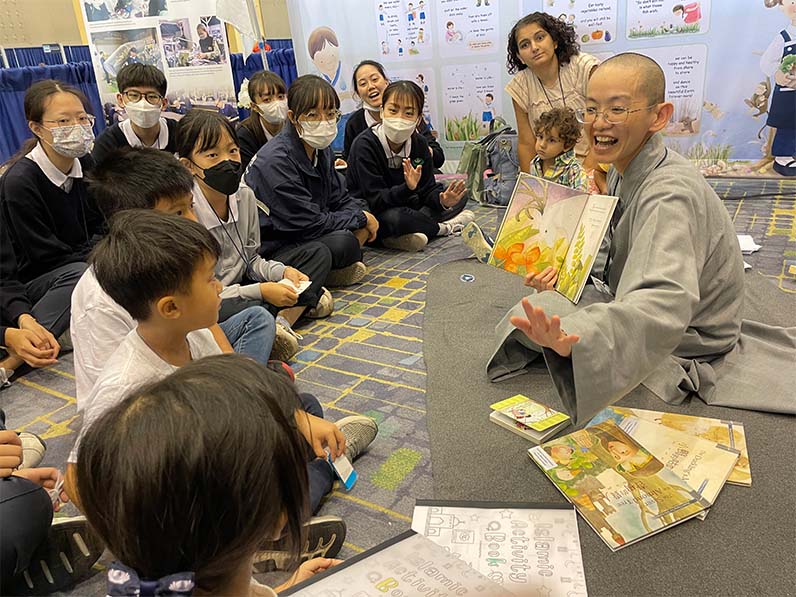
During the week, in Tzu Chi’s children’s booth, which promotes vegetarianism, Shih De Cheng also read Master Cheng Yen’s storybook, The Deer King Saves a Man, touching on the theme of caring about animals and their right to life. “We can learn from the animals, their loving spirit,” she noted. The story introduced Buddhist ideas, namely that the animal world is pure, while the human realm can be vicious as people have mental afflictions that influence their thoughts and behavior. The lesson offered was that if we are mindful and constantly reflect on ourselves, we can return to our original purity and goodness and be compassionate to all sentient beings.
Creating Environmental Sustainability
The “greening” of houses of worship of many faith traditions has become an international movement. The shift to environmental sustainability focuses on such practices as adopting renewable energy, energy conservation, diet and food production, reducing plastic, waste management, and plants and trees on land belonging to the congregation. It also includes education in the teachings of the community’s religion on the vision and values of our relation to the natural world and integrating these teachings into liturgy, prayer, and study.
In the “Greening of Congregations: The State of the Movement” session on August 17, moderated by Laurel Kearns, co-founder of the Green Seminary Initiative, Shih De Cheng introduced Master Cheng Yen’s holistic environmental vision for the Jing Si Abode where she resides, which is also the Buddhist Tzu Chi Foundation’s global headquarters. Shih De Cheng announced that Tzu Chi joined the race to NET Zero by developing a plan to reduce its carbon emissions, hoping to reach the NET Zero goal by 2050.
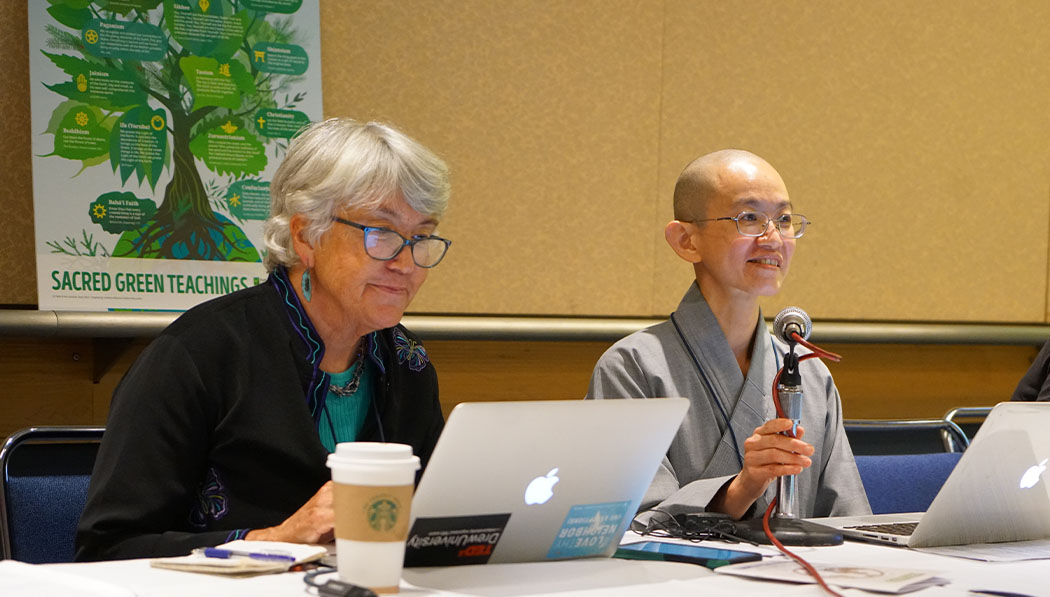
However, before explaining the many greening aspects of the Jing Si Abode, she spoke of how Master Cheng Yen is a powerful example herself. “Apart from advocating for others to live an environmental lifestyle, she also lives a life of great simplicity,” Shih De Cheng revealed. She described how Master Cheng Yen uses one basin of water per day for all her needs, and uses the same sheet of paper four times, writing first with a pencil, then a blue pen, then red, and finally a brush. “She truly practices what she preaches, how to save resources in everyday life.”
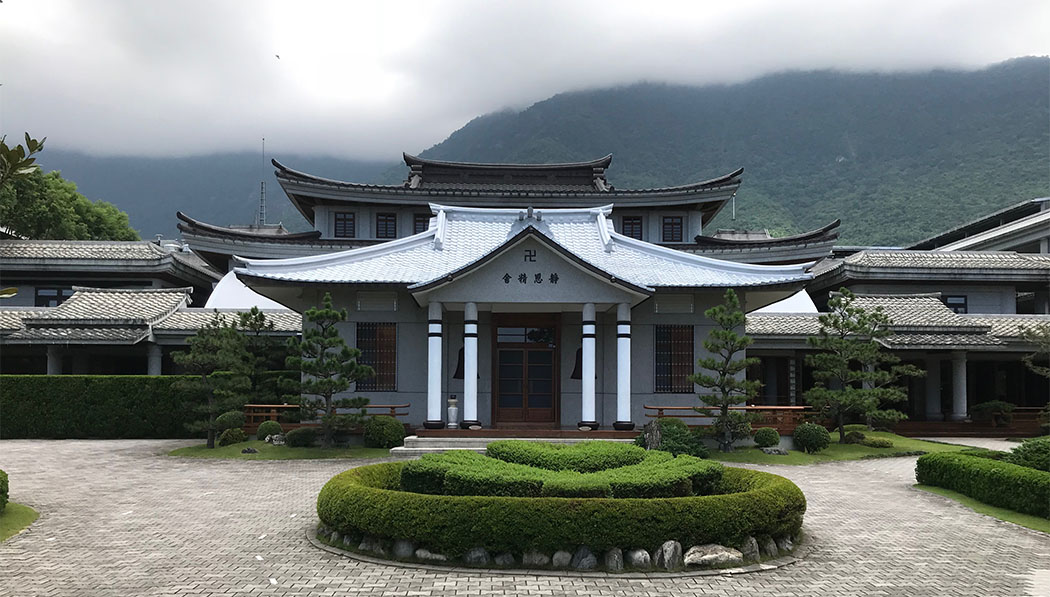
Master Cheng Yen’s environmental vision is one of cherishing resources and material life. Shih De Cheng spoke about how the monastics at the Abode follow Master Cheng Yen’s life principles: “We reduce, reuse, repair, and recycle. We eat only plant-based food and turn food waste into fertilizer and enzymes that go back into the field we use for food production, growing vegetables and plants. We use electricity sparingly and pass the hot summer without air conditioning except in the computer room, meeting room, and food factory. And if our clothing wears out, we patch it to minimize textile waste.” The nuns repurpose objects, too; for instance, canisters that previously held cooking oil become dust pans.
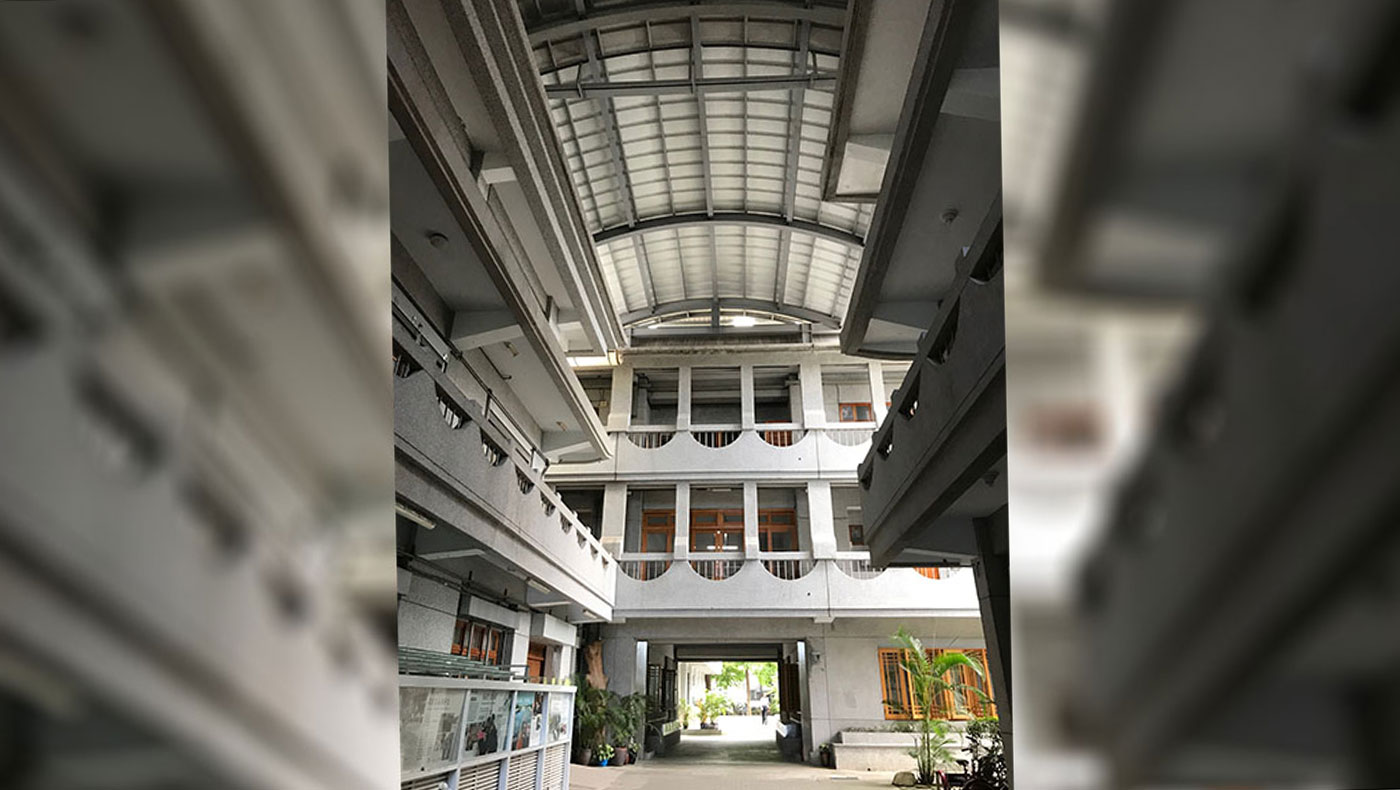
Shih De Cheng presented how the buildings at the Jing Si Abode have multifunctional, eco-friendly, and energy-saving features that encompass the choice of materials and design aspects, such as strategic use of light and shadows and wood grating in ceilings to allow hot air to escape and cool air to enter, achieving energy savings and carbon reduction. The Abode puts a lot of effort into using water as efficiently as possible, too, with modified dishwashing troths that reuse water over several rinses. The grounds also have a rain catchment and storage system, with ecological pools and a detention basin to allow rainwater to flow naturally, enabling flood protection and water security.
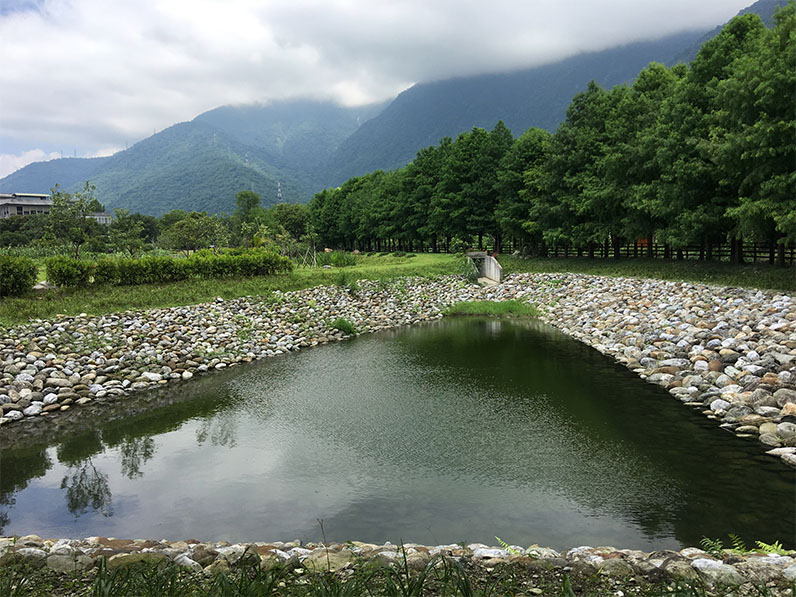
Shih De Cheng also spoke about Tzu Chi’s vast recycling operations in Taiwan and revisited Master Cheng Yen’s advocacy of adopting a plant-based diet since “By reducing demand for meat, we reduce the negative environmental impacts of livestock farming, a main driver in all three aspects of the planetary crisis, climate change, pollution, and biodiversity loss.” She ended by warning that the race to reach environmental sustainability is urgent.
As of today, according to the Climate Clock, we just have five years and 339 days left to take action to prevent the worst effects of global warming from becoming irreversible. It is time to wake our inner conscience and turn green thoughts into action to protect the Earth.
Ven. Shih De Cheng
The other speakers of different faith traditions shared about their congregations’ greening initiatives and philosophies, creating an inspiring ensemble of approaches and solutions.
Rabbi Daniel Swartz, Executive Director of the Coalition on the Environment and Jewish Life, spoke of how we need to think of greening congregations as a set of concentric circles: “At the core, it’s what you physically do to the building. But a congregation isn’t just the building. You have a multiplier effect if everybody in the congregation is doing in their home what you’re doing in the building. So, that second circle is all the people associated with the congregation. And the third circle is to be an advocate. You have a call to speak beyond your community.”
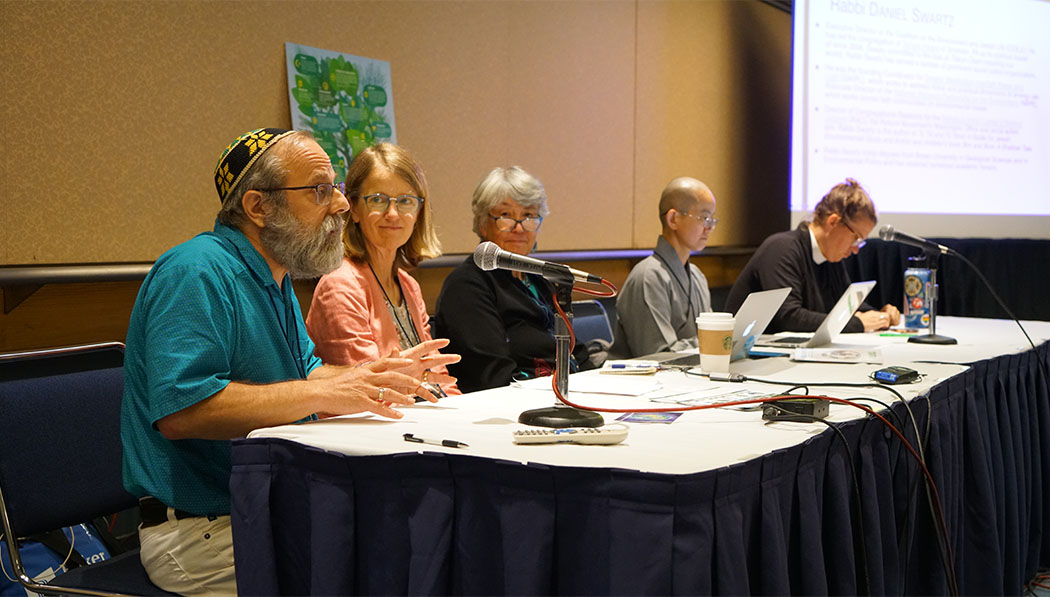
Sarah Paulos, the Community Engagement and Programs Manager for Interfaith Power and Light (IPL), spoke about how it is helping green congregations across the United States. “IPL invites congregations to reduce the emissions from their worship facilities that contribute to climate change as an act of faith. There are approximately 400,000 houses of worship in the United States; this represents tremendous potential to contribute to carbon emissions reduction goals for our country. We can cut costs, care for our sacred earth, and care for our neighbors. It’s a win-win-win situation.”
Rev. Abby Mohaupt, Director of Education and Training at GreenFaith, spoke about the nonprofit’s evolving work, which now includes responding to climate and environmental injustices. “The original work of training congregations and people of faith to work in their communities shifted from more traditional greening congregations to system change and [creating] over 100 green faith circles [that] respond to how the fossil fuel industry [and] deforestation are affecting their communities, [and organizing] to determine responses to climate emergencies on the ground and in their work.”
Mohaupt then donned her Presbyterian hat, as she is an ordained minister, and described how “The Presbyterian Church USA has always been embedded in caring for creation, which is how we as Christians talk about the natural world. As a branch of Christianity, we’ve thought about our ecological commitments in the world. We talk about how worship needs to engage ecological issues, climate justice, and environmental justice.” In conclusion, it was a powerful interfaith session that offered much to think about and apply.
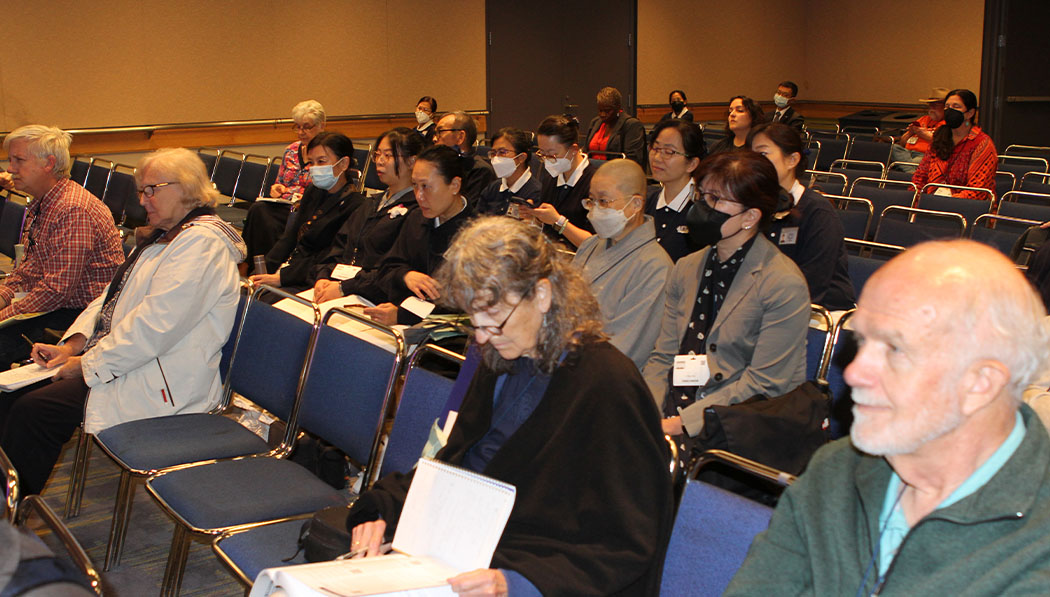
Upholding the Global Ethic
On August 17, during the “Women’s Perspectives on the Global Ethic” session, it was Shih De Huang’s turn to speak. Moderated by Sharan Kaur Singh, a Sikh and Trustee of the PoWR, four women from different faiths expressed their views on the PoWR’s Global Ethic document, “a statement of basic ethical commitments shared by people throughout the globe, religious or not,” and why gender equality is an essential part of it. Singh stated, “The Sikh religion teaches us that we are all children of one God, and women possess an equal right to cultivate their spirituality with chances of achieving salvation equal to men.”
Shih De Huang recounted that in the 1960s when Master Cheng Yen founded Tzu Chi, most people thought raising a family was the most significant asset for a woman. However, she believed women could contribute to the world’s affairs outside of gender role expectations. She encouraged her first followers, who were female, to put compassion into action as Buddhist Dharma practitioners.
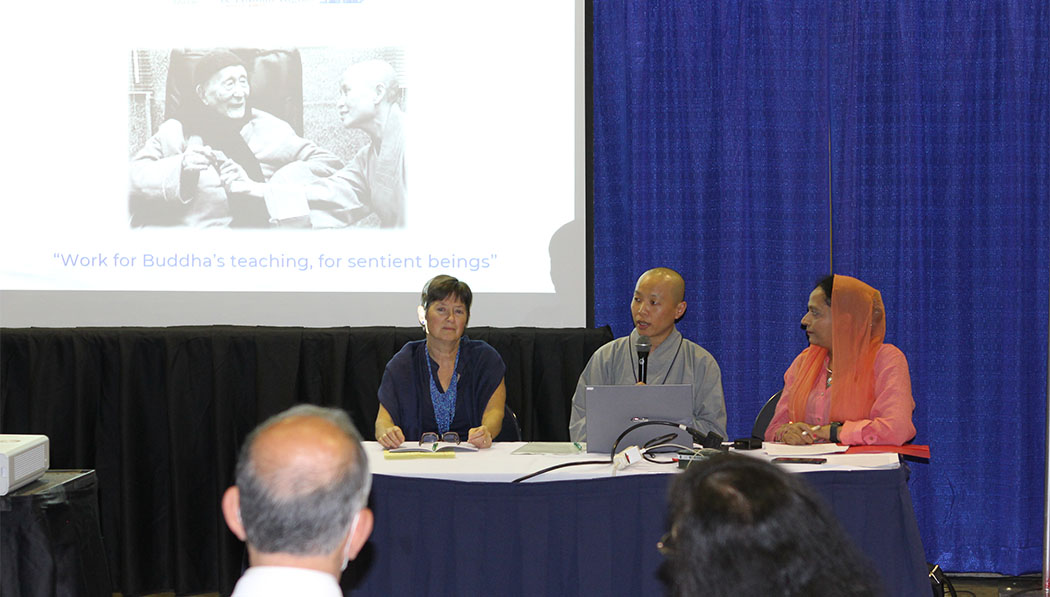
While Master Cheng Yen’s first five monastic disciples took self-reliance as a principle of practice and were ready to sacrifice themselves and endure many hardships, her lay followers, 30 local homemakers, helped fund the charity’s work with daily donations, pennies a day saved from their grocery money. People learned of the mission to help relieve suffering and began contributing. “Among the first Tzu Chi committee members, women accounted for about 60% of the member body,” Shih De Huang stated. Today, the top executive director roles in Indonesia, Malaysia, and the USA, the three largest Tzu Chi overseas chapters, are held by women.
In Master Cheng Yen’s Tzu Chi School of Buddhism, everyone can do good and benefit the world. She created a system of pure practitioners – lay followers who devote themselves to the Tzu Chi mission with pure cultivation, dedicating their lives and taking on additional vows and precepts. They are the equivalent of monastics without the need to shave their head, take the Jing Si Abode as their spiritual home, and see all sentient beings as their family.
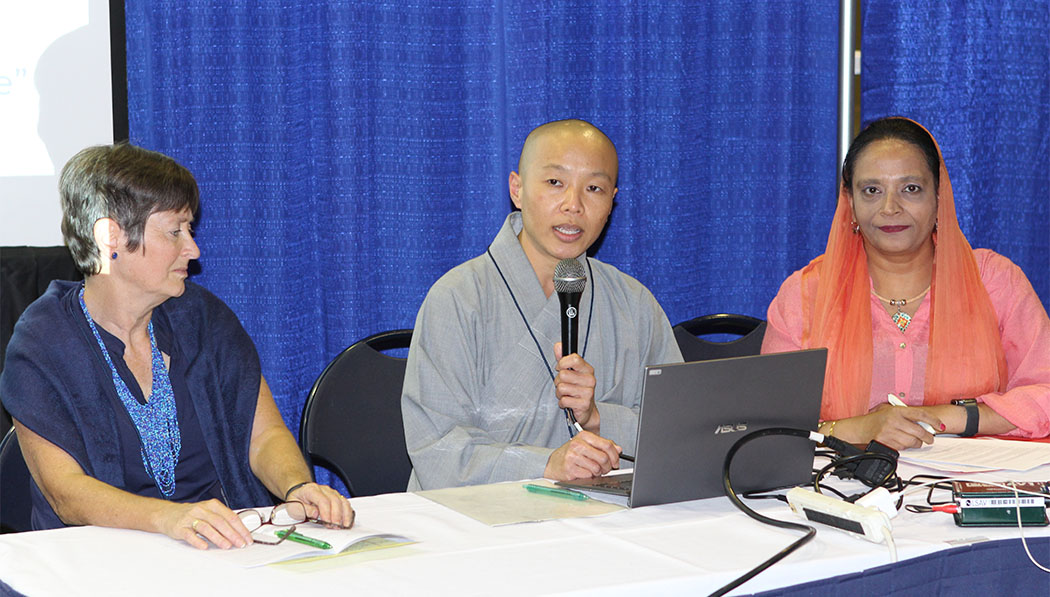
In Tzu Chi, volunteering is a form of spiritual practice as well. Shih De Huang shared that one female volunteer in Taiwan is 105 and still active, “safeguarding our environment through working at the recycling stations. She is just one of the thousands Master has empowered to enhance their life value and develop themselves.” During international relief work, Tzu Chi also uplifts female care recipients through education and vocational training, freeing low-status women from a cycle of poverty and helping them regain self-confidence, self-esteem, and empathy for others.
“Responsibility can inspire a person’s potential and awaken their conscience,” Shih De Huang said, bringing Master Cheng Yen’s wisdom to the fore. From Shih De Huang’s narrative, one could see how Master Cheng Yen didn’t wait for permission; humbly, yet boldly, she stepped outside gender roles and forged a spiritual path, a school of Buddhism, and an international nonprofit organization that inspires and values the contributions of women and men equally.
The meaning of life is not about how long we live; it’s about the depth of our life. The Buddha said the human form is rare to attain. As for this body we’ve attained, we don’t have permanent ownership but only the usage of our body as a vehicle. Our contributions might look trivial in the grand scale of things. Still, day by day, little by little, accumulating our efforts has influenced innumerable amounts of people who, in turn, extended their life and love to others.
Ven. Shih De Huang
The other speakers brought their faith perspectives to the discussion. Sahar Alsahlani, a Muslim and co-chair of The Fellowship of Reconciliation, an interfaith organization, represented the Islamic view. “When I look at the Global Ethic, I wonder if it actually encompasses everything Islam has to offer women in their rights,” she divulged, adding, “I find Islam a religion that liberates me and gives me a lot of moral agency with regards to how I live my life in a very protective way.”
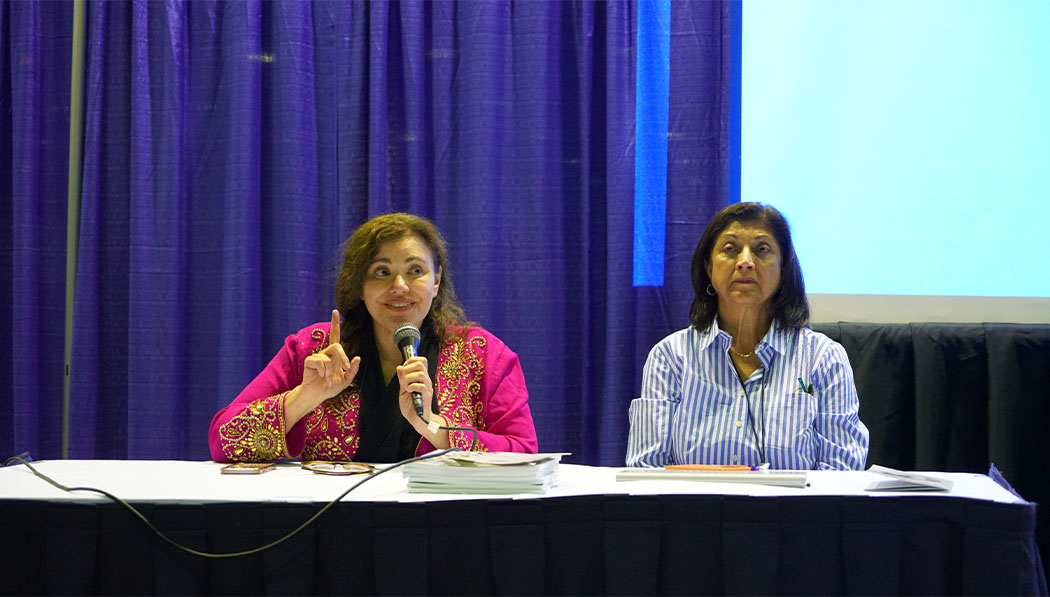
Mahrukh Motafram, a Zoroastrian and Co-Chair for the North American Zoroastrian Congress committee, shared that “Every religion and tradition has fundamental core values. Even in the most ancient of them, these fundamental principles already exist.” She cited how, in 539 BCE, Cyrus the Great, a Zoroastrian who ruled the Persian Empire, issued a proclamation to preserve human rights in cities and regions under his rule. As for PoWR’s Global Ethic, “This document gives us a roadmap, a direction, a journey we can embark upon together, a way of life where we live in peace and harmony for the preservation of our surroundings on Earth, respectful and grateful for our existence and all living beings,” Motafram said.
Mary Doak, a Roman Catholic and Christian theology professor at San Diego University, called out that the global ethic underscores the interdependence of human beings with the planet and each other, pointing us to restore and heal that connection. In this regard, women tend to “embrace interdependence and appreciate that inter-relationality,” she revealed. Doak spoke of hierarchical dualism or hierarchical binary thinking. “Everything is in relation, but things are separated into two categories, and one is valued over the other. Men over women, human over nature, white European over people of color, spirit over body, God over world. And one of the things that a lot of women have lifted as needing to be healed is hierarchical dualism,” Doak elaborated.
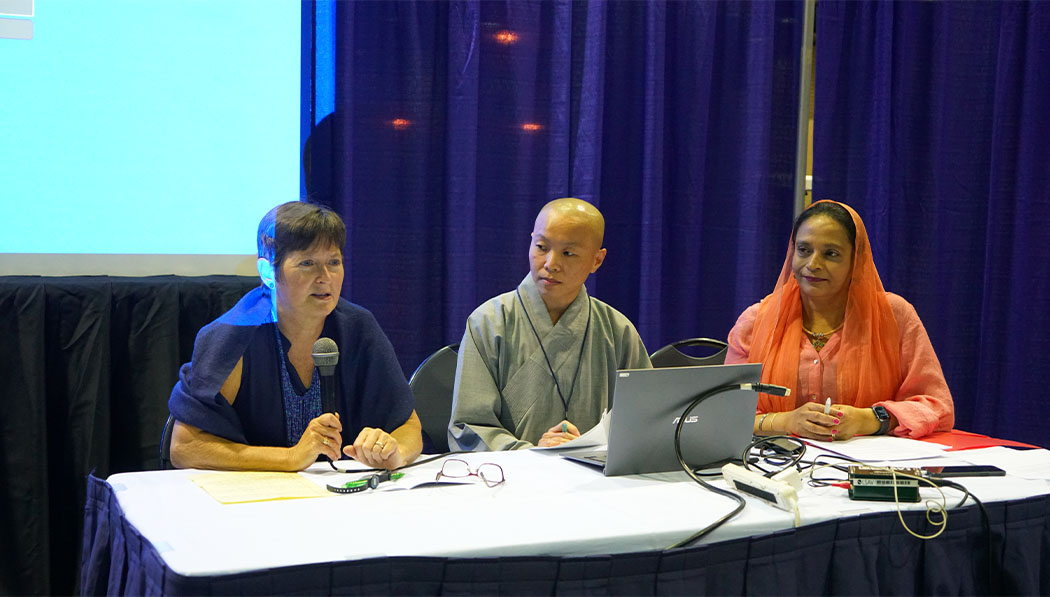
She cautioned that when we treat dominant perspectives as universal, the solutions to global crises don’t always fit everyone’s situation and needs. “There’s a call to remember differences and acknowledge the plurality. And the plurality diversity is a good and a strength that we need to foster as we seek to create a world that will work for all of us to heal the global crisis of economics, ecology, and politics,” Doak concluded.
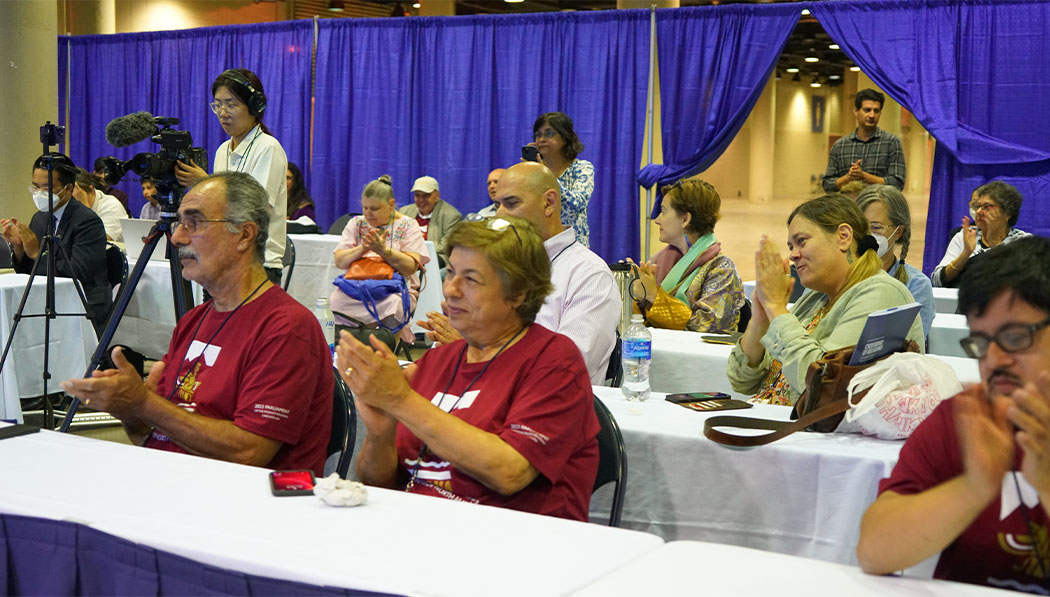
The 2023 Parliament of the World’s Religions was a stimulating experience for attendees and participants alike, including Shih De Yuan, Shih De Cheng, and Shih De Huang. And, apart from their detailed presentations, the three Dharma Masters had also fulfilled Master Cheng Yen’s heartfelt wish.
“Before we attended this conference, Master Cheng Yen met with us and said, ‘Speaking very well is not the most important thing,” Shih De Cheng recounted. “The most important thing is to show our way. When we walk, when we eat, when we behave, from these several aspects we can show the spirit of Tzu Chi. That’s the most important thing.”
Indeed, as Shih De Yuan, Shih De Cheng, and Shih De Huang traversed the enormous PoWR venue daily, joined in activities, and engaged with the public, they surely maintained ever-vigilant mindfulness and virtuous grace, an inspiration to the whole Tzu Chi delegation and all along their path.
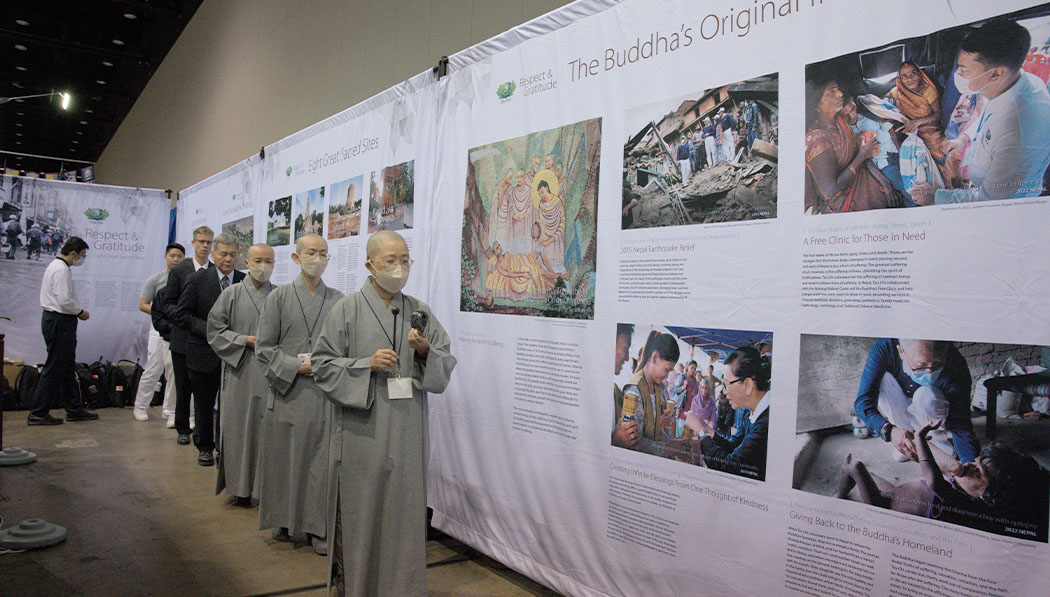
SHARE:

